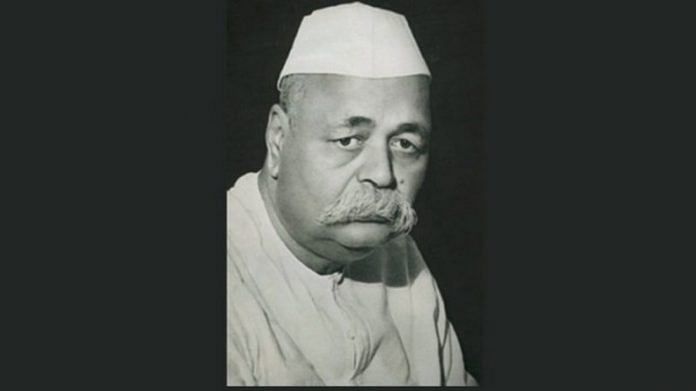New Delhi: Govind Ballabh Pant is remembered as one of the country’s most prominent freedom fighters and an administrator who played a key role in shaping modern India.
Right from protesting the zamindari system to passing the Hindu Code Bill (in Uttar Pradesh), which made monogamy compulsory for Hindu men and gave Hindu women the right to divorce and inherit ancestral property, his politics always centred on internal reform.
Pant was not only the first chief minister of Uttar Pradesh in Independent India, but also served as premier of the state’s predecessor, the United Provinces, under the British Raj.
A key player in the drafting of the Constitution, he served as India’s home minister from 1955 to 1961. It was during his tenure that states were reorganised on linguistic lines.
In 1957, Pant was awarded India’s highest civilian award, the Bharat Ratna.
On his death anniversary, 7 March, ThePrint looks back at the career of one of India’s tallest leaders.
From the mountains
Pant was born on 10 September 1887 in what is now Uttarakhand, at Almora.
When he was 18 years old, he started serving as a volunteer at sessions of the Indian National Congress, looking up to Gopalkrishna Gokhale and Madan Mohan Malaviya as his idols.
In 1907, he decided to study law, and subsequently topped the Bar examination.
After receiving his degree, he started to practise law in Almora in 1910 and eventually moved to Kashipur.
In Kashipur, he established an organisation called Prem Sabha that started working towards several reforms and also saved a school from shutting down due to non-payment of taxes to the British government.
His politics centred on reforms
It was in December 1921 that Pant started his career in politics, after he was elected to the Legislative Assembly of the United Provinces of Agra and Oudh, which he later renamed Uttar Pradesh.
He was elected as a candidate of the Swaraj Party from Nainital.
During his tenure, he raised several important issues like the need to abolish the zamindari system and championed the cause of forest preservation. He also worked to protect farmers from excessive rents levied by the British government.
He encouraged many cottage industries in the country and raised his voice against the coolie-beggar law, which forced porters to transport the heavy luggage of British officials without any payment.
Following Gandhi’s footsteps, Pant also organised a massive salt movement in the United Provinces. In May 1930, he was arrested and held at Dehradun jail.
Also read: Subramania Bharati: The Mahakavi Modi invoked in his Independence Day speech
First Chief Minister of Uttar Pradesh in Independent India
In the 1937 provincial elections held under the Government of India Act, 1935, Pant was appointed premier. He served the post till 1939, when all Congress ministers resigned after the British committed India to the Second World War of its own accord.
In 1945, the new British Labour government ordered fresh elections to the provincial legislatures. The Indian National Congress won a majority in the United Provinces election held in 1946, and Pant was once again appointed the premier.
While in office as Chief Minister of Uttar Pradesh, Pant fell ill in February 1961 and passed away on 7 March, after being in a coma for several days.
In his autobiography, Toward Freedom, Jawaharlal Nehru refers to Pant as a man who always stood by him.
While protesting against the Simon Commission, which arrived in India in 1928, Pant sustained severe injuries, an instance that also finds mention in Nehru’s autobiography.
“Govind Ballabh Pant, who stood by me, offered a much bigger target, being six foot odd in height, and the injuries he received then have resulted in a painful and persistent malady which prevented him for a long time from straightening his back or leading an active life.”
Locals of Uttarakhand, who remember Pant as a “legendary freedom fighter”, pay tribute to him each year on the occasion of his birth anniversary.
Against separate electorate for minorities
As chief minister, Pant was always against a separate electorate for minorities, saying the step would further divide communities.
In one of his speeches at a Constituent Assembly meeting, he said, “I am one of those who feel that the success of democracy is to be measured by the amount of confidence that it generates in different sections of the community. I believe that every citizen in a free state should be treated in such a manner that not only his material wants but also his spiritual sense of self-respect may be fully satisfied.”
In one of his books, (Pandit Govind Ballabh Pant: CAD, Vol 5, August 27, 1947) he is quoted as saying: “I believe separate electorates will be suicidal to the minorities and will do them tremendous harm. If they are isolated forever, they can never convert themselves into a majority and the feeling of frustration will cripple them even from the very beginning… your safety lies in making yourselves an integral part of the organic whole which forms the real genuine state.”



